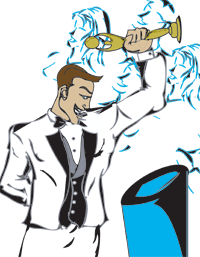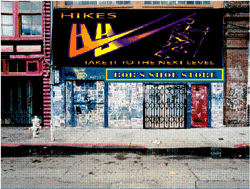|

By Jamie Turner
Illustration and design by Kevin Diggs


For nearly two decades, ad agencies like Fallon and Goodby gained prominence by dominating most of the awards shows they entered. But those days are gone. Today, clients do not care about winning awards. The only thing they care about is selling more stuff (and rightfully so). The only way to make awards shows relevant again is to revolutionize the shows and to help clients understand that there is scientific proof that memorable, engaging ads work better than 99 percent of the dreck that is out there.
But before we talk about revolutionizing awards shows and helping clients appreciate great creative, a recap of how some awards shows managed to approach the brink of irrelevance.
In the early 1980s, Fallon was a small agency in the Midwest with just a handful of clients. Today they are an agency with hundreds of millions of dollars in billings and clients that include Timberland, BMW and Time Magazine. Why the change? A lot of smart people working very, very hard. But it all started with a very specific strategy: Dominate every awards show they entered. The result would be increased recognition for a small agency that, otherwise, would be lost on the windswept plains of Minnesota.
"The emergence of Fallon was like the perfect storm," says Kurt Tausche, Founder and President of Tausche, Inc., and someone who began his own climb to national prominence in Minneapolis. "The right people with the right idea at the right time came together to become a great success. The right place? One could argue that those components would be successful anywhere. But the progressive Twin Cities community and the work ethic of the Midwest did not hurt . . . and probably helped a lot."
Many agencies in Atlanta used Fallon,s strategy. I built an agency called Turner & Turner by winning as many awards as we possibly could. My thinking was that if I could build awareness for my small, unknown agency, I would be able to attract good talent and clients. It proved to be true. During our 10 year run, we attracted some of the best talent in the Southeast and our client roster included Nextel, CNN, Coca-Cola Enterprises and Motorola.
Where did all this focus on awards shows begin? The grandfather of awards shows is the Clios. Back in their heyday, if you won a Clio, you could write your own ticket from a career perspective. "It was a big deal when I won my first Clio," says Julie Burmeister, Founder and Creative Director for The Burmeister Group. "The year before, I had been a creative assistant. Within three years of writing that spot, I was a Creative Director."
Since then, other shows have moved front and center. Communication Arts is arguably the most coveted award in the country, in part because it has so few winners. To be included even once in CA is a difficult challenge and is generally a sign that you really know what you are doing.
Then there is the One Show. One Show is to CA what the circus is to the ballet. Both are great entertainment. And both can be considered art. But the circus takes you down one path while the ballet takes you down another.
Of course, the other big national shows are the Kelley Awards and the Radio Mercury Awards. The Kelley Awards recognize the world,s best print advertising, while the Radio Mercury Awards recognize the world,s best radio advertising. Both give $100,000 to the grand prize winner . . . an obscene amount of money, in the best sense of the word.
In the mid-1980s, Ogilvy & Mather won the Kelley award three out of four years, a feat that has not been repeated since. When they accomplished this, they ran a double-page ad in Adweek commemorating the fact. On the left hand page was a letter from Norman Berry, Ogilvy,s Worldwide Creative Director, to David Ogilvy. The letter informed Ogilvy that Ogilvy & Mather had just won another Kelley Award, which meant they had won the award three out of the previous four years. Ogilvy,s letter back to Berry was on the right page. It simply said, "Dear Norman. Why haven,t we won all four?" Man, you gotta love D.O.
Traditionally, awards shows have meant a lot to the agencies who dominate them. Fallon has built an empire on their success at awards shows. And Goodby Silverstein has done the same. More recently, Crispin Porter + Bogusky has been recognized for all of their work. And why not? Crispin Porter + Bogusky has created some of the most innovative, imaginative work in the country and they deserve recognition for it.
Regionally, several agencies have dominated the shows they have entered. In the 1980s, The Martin Agency proved that you did not have to be located in New York or L.A. to do great work. And Loeffler Ketchum Mountjoy has always had a knack for creating beautiful, meaningful ads. But if recent awards annuals are any indication, there are several Atlanta based agencies that are leapfrogging ahead of these traditional regional powerhouses.
Sawyer Riley Compton is an awards show machine that has swept many of the shows it has entered over the past several years. The result has been national recognition not only in the form of awards, but also in an oh-so-coveted profile in Communication Arts magazine. But they are not the only ones who have been putting Atlanta on the map lately. Austin Kelley Advertising has, very quietly, been doing stellar work for many years. And while Austin Kelley does not promote itself as loudly as some other agencies, their work is on par with the best agencies in the region.

In similar fashion, BBDO Atlanta has been consistently churning out great work . . . yes, BBDO Atlanta. Cole Henderson Drake has been, too. And, of course, no article about awards shows would be complete without mention of Huey Paprocki, who, quietly, politely and relentlessly, have set the standard for great work coming out of Atlanta.
So, what does all this mean? Where does this obsession with little gold statues take us? Why do agencies spend countless hours and dollars fighting to preserve their creativity? Why do the top people at ad agencies worry about how an agency will do at the ADDYs, CA or OneShow?
Here is a dirty little secret. Despite all the recognition, there are several award-winning agencies in Atlanta that are no bigger today than they were when they started their pursuit of little gold statues. But if awards are so important, why haven,t these agencies grown in size as quickly as they have grown in reputation? Why aren't they attracting bigger, better and more sophisticated clients?
The reason is that clients do not care about awards. Almost any agency executive can tell stories about how a prospective client's eyes glazed over once the agency creative director started talking about the awards they have won. And most sophisticated clients know that there is a game agencies play called "Let's go win some awards." In its worst manifestation, this game involves everything from submitting ads that never ran to submitting ads for clients that do not even exist.
The Awards Show Game
There are a number of techniques agencies use to win at awards shows.
 The Small Client Technique: Find a small client who will allow you to create award-winning ads. Sell the client on the idea that in return for allowing your agency to do award-winning work, they will get professional looking ads at little or no cost. The Small Client Technique: Find a small client who will allow you to create award-winning ads. Sell the client on the idea that in return for allowing your agency to do award-winning work, they will get professional looking ads at little or no cost.
The Nike Logo Technique: Create edgy posters or POPs with the Nike (or any other large client) logo in the bottom right hand corner. In the bottom left hand corner, put mouse print that says, "Nike shoes now available at Bob's Shoe Store." Hang the poster up at Bob's Shoe Store.
The Non-Existent Client Technique: Only a handful of agencies are brazen enough to submit ads for clients that do not exist. Most of the agencies in the Southeast that used to do this are not around anymore.
The Pro Bono Technique: Find a charitable cause and create ads for them. Out of all the options above, this is the most palatable.

Here is the bottom line for awards shows now that the dirty little secret about them is out. The hours of non-billable time spent creating award-winning campaigns are not going to get an agency,s foot in the door with larger, more sophisticated clients. Those clients are much more likely to take note of awards earned for great work for a paying client that got results . . . and won awards as an added benefit. Awards are simply not the magic wands opening doors that they used to be.

Two simple things can make awards shows relevant again. The first is for shows to stop giving awards for works that are clearly joy-pop opportunities. Most people are aware that getting a small, unsophisticated client to run a joy-pop is not difficult. Getting a large bureaucratic client to run something innovative and engaging is an entirely different story. Every time an award is given to an agency for an ad for a neighborhood yoga instructor, the value of that award decreases. Every time an award is given to an agency for its work on a paying client, for work that was actually billable, the value of that award increases. The sooner awards shows are aware of this, the better.
The second and more difficult task is to make clients aware that there is scientific proof that the more engaging and memorable an ad is, the more likely a consumer is to purchase the product. An incredibly small percentage of clients and agency people are aware of this. But the science cannot be ignored.
Gerald Zaltman, Harvard Business School professor and author of How Customers Think, points out that 95 percent of our thinking happens in our subconscious mind. Brain scan technology shows that parts of the right brain light up when a person finds a commercial emotionally engaging. Additional scans show that a similar part of the brain lights up when a person has an impulse to purchase a product. Once the right brain is emotionally engaged by the commercial and shows an impulse to purchase the product, the left brain begins rationalizing the purchase. This dance between the two hemispheres is what prompts someone to buy a $100 pair of sunglasses even though the $15 pair is just as good.
Zaltman,s book and other scientific evidence supports what we have all suspected for years: the more memorable and engaging an ad is, the greater its effect on a client's sales. The sooner we help clients understand the science of award-winning, memorable, engaging ads, the sooner they will associate an award-winning agency with a good agency.
The days of building an agency's reputation through awards alone are gone. Clients do not care about winning awards; they care about selling more stuff. The only way to make awards relevant again is to revolutionize the awards shows. Give awards for ads that actually ran for real clients, not to small, joy-pop opportunities. The second part of the revolution is to help clients understand the science scientific proof that memorable, engaging ads work better than most of the ads that are out there, they will send their business to agencies that are capable of doing top-notch, stellar work.

© 2003, David Cohen - All Rights Reserved.
|



